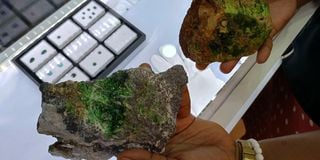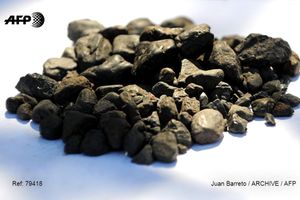
Raw gemstones of tsavorite found in Taita Taveta County on display at the Voi Gemstone Marketing Centre on September 6, 2024.
In Taita Taveta County, amidst the abundant minerals and the vast Tsavo National Park, lies a highly sought-after gem: Tsavorite.
Known for its vibrant hue and rarity, this precious green gemstone has captured the attention of many and has become a coveted treasure.
However, it has also become the focal point of a shadowy underworld of smuggling, where legal channels are bypassed, depriving Kenya of its rightful royalties.
A Nation investigation found that thousands of artisanal miners have toiled for years with little to show for it, as brokers and smugglers continue to take advantage of the miners' desperation to sell.
The nation's pursuit of tsavorite smuggling begins deep in the mines of Taita Taveta in Kambanga, Kasigau and Mkuki areas where large deposits are found.
Here, artisanal miners toil under harsh conditions, extracting the gemstones that promise instant wealth and prosperity.
Using rudimentary equipment, they dig deep tunnels, some as deep as 300 meters. Most of the tunnels are not reinforced, leading to frequent collapses... and deaths.
A few weeks ago, in Mkuki, four miners sustained injuries after their tunnel caved in.
The lack of basic amenities such as water, electricity, roads, and healthcare facilities further exacerbates their plight.
They survive on a diet of ugali, beans, and black tea, and live in shanties with little hope of improving their living conditions. This is proof that for the miners, the reality is far from the dream.
Economically vulnerable miners are often at the mercy of brokers and middlemen who exploit their labour for minimal returns.
Some die hoping for a fortune, but it's the smugglers who make a killing.
"Our poverty hinders our ability to negotiate with traders. Most miners live from hand to mouth. They are forced to accept whatever they are given, no matter how much less than what is considered a fair value for their stones," says Austin Bakari, a miner at Chawia in Mkuki.
Martin Machangara, a miner who is also the vice chairperson of Chawia Minerals, says the government’s support to the miners is minimal.
He expresses their frustration over the lack of support and urges the government to ensure that the wealth generated from its natural resources benefits its people.
He says non-governmental organisations such as the Association of Women in Energy and Extractives in Kenya (Aweik) have supported the miners by sensitising them on safety, in addition to linking them to markets.
"We work hard, but we see very little of the wealth generated from these stones. Apart from conducting inspections and issuing licences, which we pay for, there is no support from the government. The high cost of modern mining technologies makes it impossible for us to upgrade our operations, so we are trapped in a cycle of exploitation and danger," he says.
Precious stones
He adds that they are forced to sell their precious stones at throwaway prices to make ends meet.
Gemstones do not follow standardised grading systems like diamonds, so their worth is ascertained by examining their colour, clarity, cut, carat weight, and origin.
The Nation team observed that once the tsavorite is extracted, it embarks on a journey with crafty smugglers, well-versed in evading authorities, transporting the gemstones across borders to reach international markets.
Sometimes they are alleged to be used in money laundering schemes.
The illegal trade deprives Kenya of significant revenue, as the gemstones bypass legal channels and deny the country’s rightful royalties.
Unfortunately, the illegal trade is facilitated by a network of dealers, both local and foreign, who operate in the shadows.
It has been found that foreign nationals, some on tourist visas, have infiltrated the gemstone market and are operating in Voi town in blatant disregard of Kenyan mining laws.
The foreigners from South Asia dominate and control the business, renting offices from local dealers at Sh100,000 monthly rent.
These offices have become hubs for illegal transactions, with the legitimate licence holders turning a blind eye in exchange for a fee from foreign traders.
The law requires foreigners doing business in Kenya to have work permits and appropriate licences.
The Mining Act 2016 section 159 outlines clear guidelines for anyone dealing in minerals in Kenya and prohibits anyone from carrying out any activity with miners without the requisite licences or permits.
Foreign entities may obtain a mineral trader's licence, but they must state their country of origin and the minerals they wish to trade.
They must also follow the same licensing and permitting processes as local entities.
The Act also emphasises transparency and accountability, requiring detailed operational and financial reports from foreign companies in an attempt to mitigate illicit market influence.
Every sale of minerals must be accompanied by an invoice for purposes of valuation and every licensed dealer must provide the source and sale records of all minerals transacted.
The Act also states that artisanal miners should sell their minerals to the National Mining Corporation (Namico) or licensed dealers and brokers.
Tax evasion
However, the current situation in Voi encourages tax evasion, as the foreigners lack the licences and no one monitors the transactions conducted by these foreign nationals.
A spot check by Nation revealed that each of these rented offices houses two foreign nationals who buy gemstones at throwaway prices.
They keep inaccurate records of their transactions and sometimes no records at all.
The lack of proper record keeping and transparency means that the true value of the gems is never known, resulting in a significant loss of potential tax revenue.
Illegal trade not only deprives the Kenyan government of significant revenue, but also undermines the integrity of the gemstone market.
"Sometimes they take the phone number of the seller and do the transactions outside the office, like in hotel rooms," said one dealer, who spoke on condition of anonymity for fear of reprisal from colleagues.
The investigation revealed that more than 100 foreigners are involved in this illegal business in Voi town.
It was revealed that security officials are fully aware of their activities, and the illegal businesses have become a significant source of corruption among some government officials and police.
"When they come, they pay a small amount to the security officials to protect their interests. The dealers who have rented their offices are the ones who facilitate this," the dealer added.
There have been several meetings between security officials and mining officials in Voi to see how the situation can be rectified.
One police officer, who asked not to be named because he was not authorised to speak on the matter, said it was a waste of time to arrest the foreigners.
According to him, they are well-connected and wealthy and use this to evade the law.
However, Voi sub-County Police Commander Ibrahim Dafalla said any foreigner involved in illegal activities must face the law.
Dafalla said they would work with other multi-agency departments to take action against foreigners involved in the illegal mineral trade in the area.
"We will work with the Immigration Department to know the status of their visas and then take the necessary action," he said.
The Nation observed that the foreigners are operating out of offices in well-known hotels in Voi CBD and several multi-storey commercial buildings in the town.
Miners and traders involved in the sector revealed that the cartels control the market prices of gemstones, locking out most local dealers.
Although there are no exact figures on how much revenue the Kenyan government loses through these unscrupulous deals, the loss is high because these traders also smuggle the stones through land borders and airports.
According to an official at the Ministry of Mining, who spoke on condition of anonymity, because he was not authorised to speak to the media, the loss of revenue occurs when the buyer undervalues the stone during the export valuation.
The source explained that there is no verification of the true value during the transactions with the sellers, resulting in the government receiving little revenue during the export declaration. This is worrying as the stone could be worth millions of shillings.
While the demand for gemstones comes mainly from the West, the actual cutting and polishing is done mainly in the East, particularly in Bangkok, Thailand, and cities in India and Sri Lanka.
These countries offer low-cost labour for value addition due to their extensive experience in gemstone processing.
This is because it is more expensive to add value in countries such as the United States than in India or China, where labour is more affordable.
Consequently, these countries have become significant players in the gemstone market, attracting large-scale gemstone markets and establishing themselves as key contributors to the global gemstone value chain.
The Ministry of Mining has emphasised that the sector, which currently contributes around 1 percent to the national GDP, has the potential to increase its contribution to at least 10 percent.
However, the rampant smuggling and non-disclosure of sales by traders hinder this growth.
Globally, the illicit trade undermines the integrity of the gemstone market and consequences Tsavorite, a uniquely Kenyan product, loses its value and authenticity when sold through illegal channels.
This not only affects the market prices but also tarnishes Kenya's reputation as a legitimate source of precious gemstones.
Although the government has opened the Voi gemstone and value-addition centre to curb the rampant illicit trade in gemstones and ensure that the wealth generated from these precious stones benefits the local community, the traders have evaded the facility.
It provides a wide range of services, including stone cutting and polishing, a gemstone laboratory, and a buying centre.
This will not only enhance the quality and value of the gemstones but also ensure that all taxes are paid before export, thereby curbing smuggling and illegal trade by eliminating unscrupulous dealers.
In response, Mining Principal Secretary Elijah Mwangi said the government has been making efforts to combat the illicit trade by deploying mineral inspectors and geologists to all official border exit and entry points to enhance surveillance systems and inspect all mineral-based cargo on export.
Illegal mining
"These officers have strict instructions to thoroughly examine and verify the compliance of owners with all aspects of the mineral export processes. This measure aims to prevent misdeclaration of minerals," he said.
The PS also said the government had established a special police unit, known as the Mining Police, to address compliance challenges and strengthen monitoring of mineral transportation.
"The unit is already collaborating with security agencies to crack down on illegal mining and mineral smuggling," he said.
Additionally, he said, a mandatory Road-Movement Permit has been introduced for all mineral transporters to trace the source and movement of minerals, prevent intra-county smuggling, and ensure fair distribution of mineral royalties.
According to Mr Mwangi, this initiative will reinforce and enhance the monitoring of various minerals.
On the issue of foreigners trading in gemstones without licenses and permits, the PS issued a warning about the illegal trade.
He emphasised that dealing in minerals without a licence is illegal stating that according to the Mining Act 2016, the Cabinet Secretary for Mining has the authority to cancel or revoke any license if its owner has violated its conditions.
"While the law does allow for dealing and trading, individuals interested in this business are required to apply for licenses," he said.
He also said the government has made efforts to curb smuggling and illicit trade, including the establishment of the Voi Gemstone Value Addition Centre.
On the measures that the ministry has implemented to ensure the safety and health of miners, particularly in artisanal and small-scale mining operations, Mr Mwangi, emphasised the importance of formalising their operations to enhance safety.
He urged them to join cooperatives to get assistance from the government.
"Artisanal mining has been decriminalised by the cabinet, granting them legal recognition. By organising into groups, the government can easily provide safety training and capacity building to ensure the well-being of the miners and their mines," he said.
On their part, the Kenya Revenue Authority (KRA) confirmed that no minerals destined for Tanzania have been recorded in the last one year at the border posts.
The Commissioner for Customs and Border Control Dr Lilian Nyawanda said the authority has enhanced border control measures and stakeholder engagements.
"For the last one year, we have not handled any consignment of minerals destined to Tanzania through the Taveta-Holili One-Stop Border Post (OSBP)," she stated.
She said KRA has engaged with stakeholders to sensitise cross-border traders and the community on the importance of using the OSBP.
According to KRA, domestic taxes from the Mining and Quarrying sector in the financial year 2023/24 had reached Sh10.197 billion up from Sh10.028 billion in the previous year.
Dr Nyawanda said the authority is working with the Ministry of Mining and Blue Economy to facilitate legitimate trade at the border, ensuring that the region benefits from its mineral resources.










